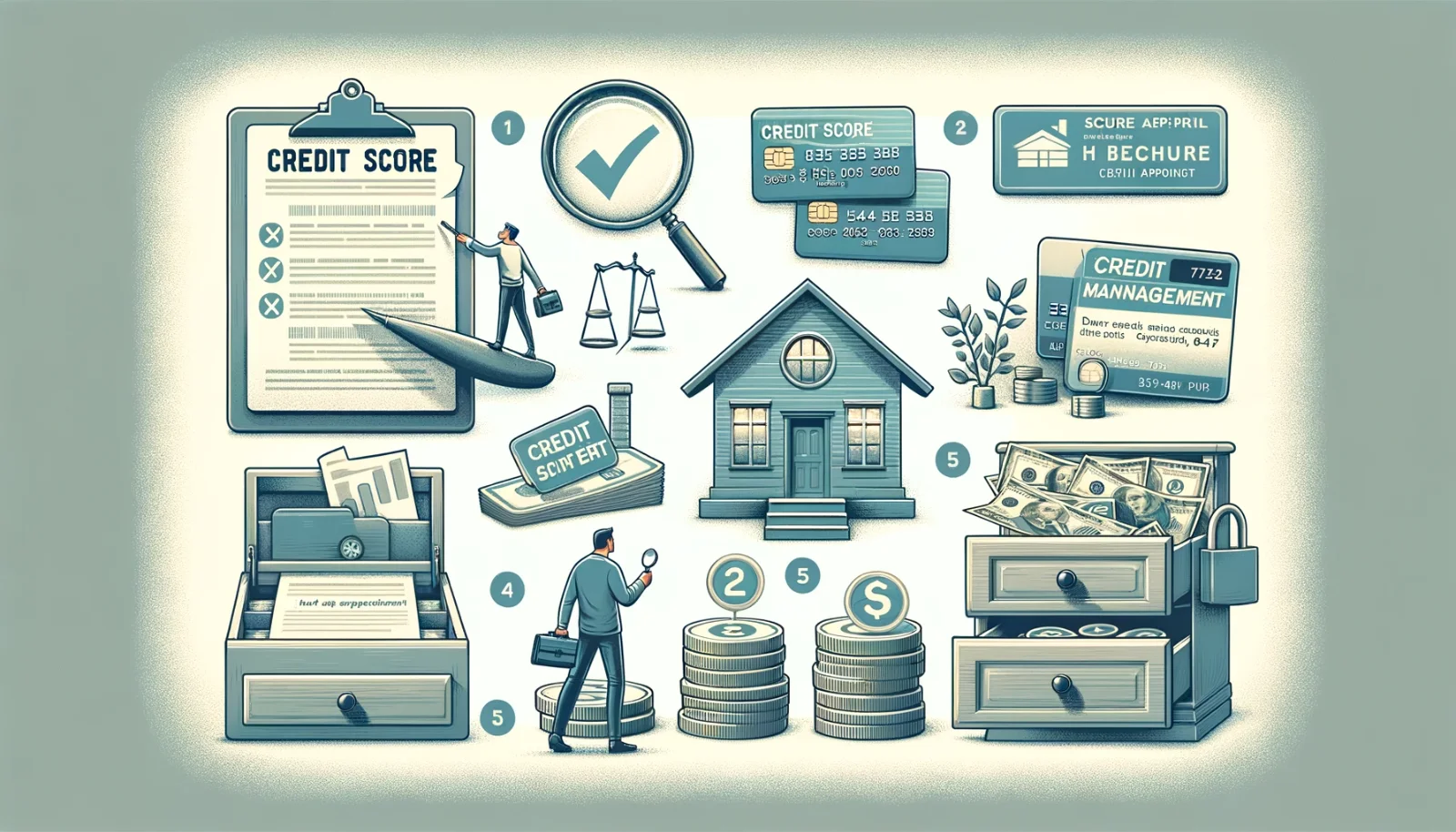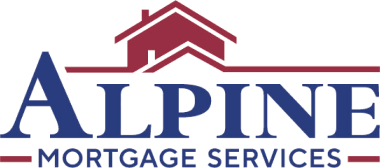Bad Credit Mortgage Loans
How to Buy a Home with Bad Credit
At Alpine Mortgage, we don’t believe life’s financial setbacks should keep you from achieving your dream of homeownership. We offer bad credit home loans for consumers with less than perfect credit or low credit scores. Our bad credit mortgage products can get you on the path to homeownership and financial freedom.

What Do Mortgage Lenders Consider a Bad Credit Score?
Mortgage lenders consider any credit score under 620 as bad credit when evaluating loan applications. This range can vary slightly among lenders, but generally, scores below 620 may result in higher interest rates or a loan denial due to bad credit. Conventional loans require 620 credit score and have waiting periods after a bankruptcy or foreclosure before a borrower can apply for a loan. Mortgage lenders look at credit scores as a major factor in determining eligibility for a mortgage loan especially for individuals with bad credit, offering various loan options like FHA loans, VA loans and USDA loans that accommodate lower credit scores.
Our home loans for bad credit are for individuals whose credit history won't qualify for conventional loan financing. We offer mortgage loans for borrowers looking to buy a house or refinance their existing home and take cash out to payoff other debts. Borrowers can qualify for these loans even if their credit history has any of the following:
- Low Credit Scores. Minimum credit score as low as 500.
- Bankruptcy. No waiting period after a Chapter 7 or Chapter 13 bankruptcy.
- Previous Foreclosure. No waiting period after a foreclosure.
- Late Payments. Credit card and installment late payments permitted.
- Charge-offs & Collections. Charge-off & collection accounts permitted.
These and many other credit related issues can be overcome by working with bad credit mortgage lenders that specialize in mortgage loans with poor credit. Alpine Mortgage has a team of highly skilled industry professionals familiar with our less than perfect credit mortgage programs.
Bad Credit Loan Programs
Below are some of the details of our bad credit home loan programs.
| Loan Type | Min. Credit Score | Min. Down Payment |
|---|---|---|
| FHA | 580 | 3.5% |
| FHA Low Score | 500 | 10% |
| VA | 580 | 0% |
| USDA | 580 | 0% |
| Non-QM | 500 | 20% |
FHA Loans
The Federal Housing Administration (FHA) insures FHA loans for consumers with poor credit, providing a safety net that allows lenders to offer mortgage loans with more lenient terms. These loans are government backed so individuals with poor credit histories have access to home financing. The FHA’s backing means that lenders can offer these loans with no risk-based pricing adjustments, making them a good option for those looking to buy a house with bad credit.
Our FHA loans are designed for home buyers with bad credit or very low credit scores, perfect those who might otherwise be excluded from the housing market. With credit scores as low as 580 and a minimal down payment of just 3.5%, and even down to a 500 credit score with a larger minimum down payment of 10% or more, FHA loans are very accessible. For borrowers with a Chapter 7 bankruptcy there is a 2 year waiting period after discharge. There is no waiting period for a Chapter 13 bankruptcy after 12 months of payments in bankruptcy have been made. There is a 3 year waiting period after a foreclosure.
FHA also offers a home renovation loan, called the FHA 203(k) Renovation loan, where homebuyers and homeowners can finance the cost to renovate their home. The FHA 203(k) renovation loan can accept credit scores as low as 580.
VA Loans
For veterans our VA loans offer favorable terms even with a less than perfect credit history. The VA loan is for service members, veterans and eligible spouses, providing benefits such as 0% down payment, no mortgage insurance and flexible credit score requirements. VA loans can go down to a 580 credit score with no down payment required. Additionally, VA loans do not require mortgage insurance which makes them an attractive option for eligible borrowers. There is a 2 year waiting period after discharge of a Chapter 7 bankruptcy and no waiting period for a Chapter 13 bankruptcy after 12 months of payments in bankruptcy have been made. There is a 2 year waiting period after a foreclosure.
USDA Loans
For buyers in rural areas, USDA loans offer 100% financing options and lower credit score requirements that can go down to a 580 credit score. There is a 3 year waiting period after discharge of a Chapter 7 bankruptcy and a 1 year waiting period after a Chapter 13 bankruptcy. There is a 3 year waiting period after a foreclosure.
Non-QM Loans
We have a variety of other Non QM loan programs available for borrowers that need more flexibility with credit scores down to 500 and no waiting periods after a bankruptcy or foreclosure.
How to Get Pre-approved for a Bad Credit Mortgage
Getting pre-approved for a bad credit mortgage is quick and easy with our online Loan Application. After completing the application you will receive instructions on how to upload your documents. For a list of documents you will need to upload, see our Pre-approval Document Checklist.

What is a Credit Score?
A credit score is a numerical representation of an individual's creditworthiness, ranging from 300 to 850. This three digit number is used by lenders to assess the risk of lending money to a borrower. A higher credit score indicates a lower risk, while a lower score suggests a higher risk. The most widely used credit scoring model is the FICO score, developed by the Fair Isaac Corporation. The scores are calculated by major credit reporting bureaus such as Equifax, Experian, and TransUnion.
How Your Credit Score is Calculated
There are several factors involved in the calculation of a credit score:
- Payment history (35% of your score): which shows whether you have paid past credit accounts on time.
- Credit utilization (30%): This is the amount of credit you're using compared to your available credit limits. Keeping balances low on credit lines or increasing credit limits without hard inquiries can significantly boost your score.
- Length of credit history (15%): reflecting the duration of your credit accounts.
- New credit inquiries (10%): Applying for multiple credit accounts in a short period can temporarily lower your score.
- Credit mix (10%): Having a diverse mix of credit types (e.g., credit cards, installment loans, mortgages) can positively impact your score.
Timely payments and effectively managing various credit accounts are important in determining the credit score, influencing low credit score mortgage approval rates and loan terms.
| Credit Score Range | Rating | Impact on Mortgage |
|---|---|---|
| 300-579 | Poor | Higher risk, fewer low credit score mortgage options available |
| 580-679 | Fair | More mortgage options, but potentially higher interest rates |
| 680-739 | Good | Better interest rates and mortgage terms |
| 740-779 | Very Good | Even better rates and terms |
| 780-850 | Excellent | Best rates and mortgage terms |
How to Improve Your Credit Score Before Buying
- Check Your Credit Report for Errors: Mistakes on your credit report can drag down your score. Regularly review your credit report for inaccuracies and dispute any errors.
- Keep Your Credit Accounts Open (for Now): Closing credit accounts can increase your credit utilization ratio, negatively impacting your score. Keep accounts open to maintain your available credit.
- Add New Accounts: Opening multiple credit accounts at once can be risky but if managed wisely can increase your total available credit and improve your credit utilization ratio, potentially boosting your score in the long run.
- Avoid Unnecessary Hard Pulls: Hard inquiries can temporarily lower your credit score. Avoid applying for new credit in the months leading up to your mortgage application.
- Avoid New Credit Cards and New Debt: New credit cards and debt can increase your debt-to-income ratio and decrease your credit score. Focus on paying down existing debts.
- Save for a Larger Down Payment: A larger down payment can compensate for a low credit score by reducing the lender's risk, potentially leading to better loan terms.
- Lower Your Debt-to-Income Ratio: Reducing your overall debt before applying for a mortgage can improve your debt-to-income ratio, making your application stronger to lenders.
Mistakes to Avoid When Applying for a Bad Credit Mortgage
When applying for a bad credit mortgage, there are several mistakes to avoid:
- Not checking your credit report: Review your credit report for errors and dispute any inaccuracies before applying for a mortgage.
- Applying for too many loans: Each time you apply for credit, a hard inquiry is made on your credit report, which can lower your score. Limit your applications to a few lenders within a short period.
- Not saving enough for a down payment: While some bad credit loan programs allow for lower down payments, saving a larger amount can help you secure better loan terms and rates.
- Not considering the long-term costs: Bad credit mortgages often come with higher interest rates and fees, which can significantly increase the overall cost of the loan. Make sure you understand the long-term financial implications before committing to a mortgage.
- Not working to improve your credit: While it's possible to secure a mortgage with bad credit, taking steps to improve your credit score can help you qualify for better loan terms in the future.
Finding the Right Bad Credit Mortgage Lender
If you have bad credit and are looking for a mortgage, you may face challenges when applying through traditional banks. These institutions often have strict lending requirements making it difficult for borrowers with credit issues to qualify for a home loan. However, there are alternative options available such as working with a bad credit mortgage broker who specializes in helping individuals with credit issues.
A mortgage broker for bad credit acts as an intermediary between borrowers and lenders. These professionals have established relationships with a wide range of bad credit mortgage lenders and can help borrowers find the best mortgage terms that fit their unique financial profile.
When working with a bad credit mortgage broker, borrowers can expect:
- Access to multiple lenders: Brokers can connect borrowers with multiple bad credit mortgage lenders, increasing their chances of finding a suitable loan program.
- Personalized guidance: A skilled broker will assess a borrower's financial situation, credit history and homeownership goals to recommend the most appropriate loan options.
- Assistance with credit improvement: Some brokers may offer guidance on how to improve credit scores which can lead to better mortgage terms in the future.
- Streamlined application process: Brokers can help borrowers navigate the mortgage application process.
Embracing a new financial beginning is possible with Alpine Mortgage. Our bad credit mortgage loans are tailored to meet your unique circumstances, helping you secure a home while improving your financial health. Our bad credit loans are available in the following states: California, Colorado, Connecticut, Florida, New Jersey, New York, Ohio, Pennsylvania and Texas.
Call us today at (800) 876-LOAN to speak with one of our bad credit mortgage specialists or click here to have one of our bad credit home loan specialists contact you.
Bad Credit Mortgage FAQs
- Improve Your Credit. Ensure all bills are paid on time as late payments can affect your credit score. Also, lower your credit utilization ratio by paying down existing debt. Aim to keep your total outstanding at at 30% or less of your total credit limit.
- Save for Larger Down Payment. Saving for a larger down payment of over 10% qualifies you for more options.
- Work with a Credit Repair Specialist. A credit repair specialist can help with fixing errors on your credit report and improve your credit scores.
You'll need to provide various documents, including proof of income (such as pay stubs or tax returns) and recent bank statements. For a complete list of documents needed, see our document checklist.
Government backed loan programs, such as an FHA loan, VA loan and USDA loan, are usually the easiest type of loan to get approved for.
Good income will help lower your debt ratio and is a strong compensating factor that lenders take into consideration when evaluating an applicant with bad credit.
Most negative information will remain on your credit report for 7 years, including late payments, charge-offs, collections, and most public records.Bankruptcies can stay on your report for up to 10 years, depending on the type.
The time it takes to improve your credit score depends on your starting point and the actions you take. Some improvements, such as paying down debt, can have a quick impact, while others, like building a history of on-time payments, may take several months or more to reflect positively on your score.
Applying for a mortgage will result in a hard inquiry on your credit report, which may cause a slight, temporary dip in your credit score. However, multiple inquiries from mortgage lenders within a short period (usually 45 days) are typically treated as a single inquiry, minimizing the impact on your score.
Bad Credit Tools & Advice
Get a Quick Quote
"*" indicates required fields
